On a recent visit to Athens, Tennessee, my daughter and I discovered a piece of history that few remember but all should know—the Battle of Athens. A stop at the McMinn County Historical Society and Archives led us to the story of the veterans who refused to let democracy be stolen in their own backyard. Their fight serves as a powerful reminder that the integrity of elections depends not just on ballots but on the courage to defend them. This blog post is inspired by that lesson.
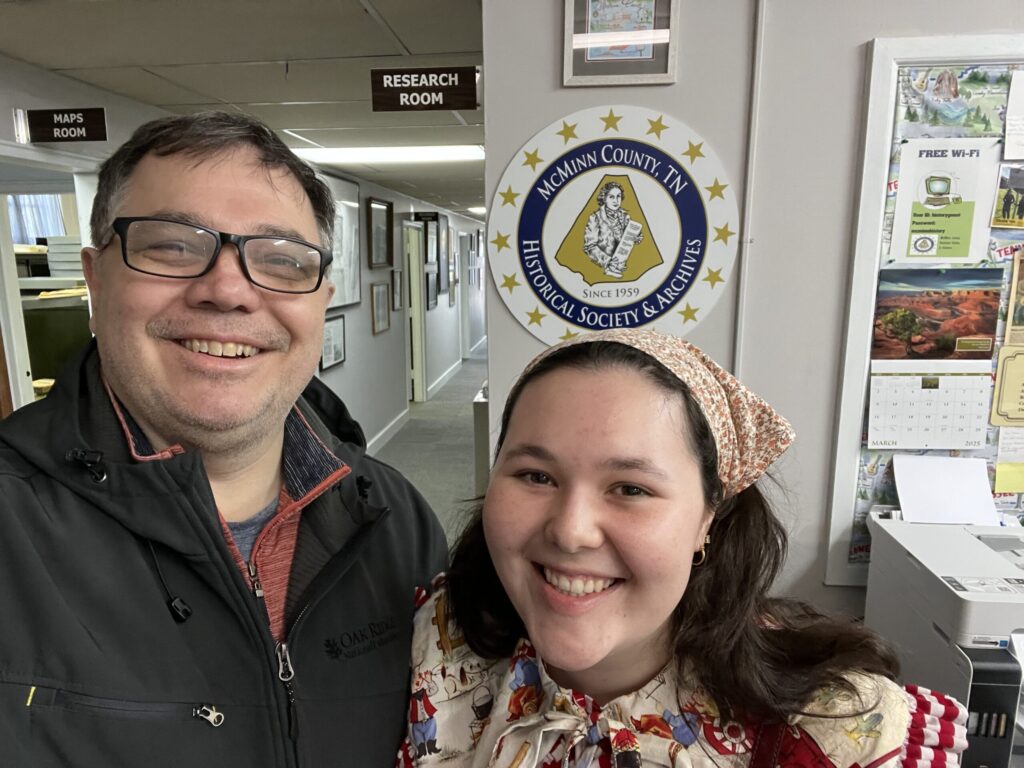
Grace and I with a selfie in the McMinn County Historical Society and Archives. We had a great discussion with two archivists. (Photo by D. Page.)
A Forgotten Fight for Free Elections
The Battle of Athens is little known today, but it marked a dramatic and important moment in American history. It took place in August 1946 in Athens, Tennessee, a small town nestled in the Tennessee River Valley between Chattanooga and Knoxville.
World War II had ended, and American veterans were returning home after defending democracy overseas against the totalitarian regimes of Hitler and Tojo. Yet many of these veterans, including those in Athens, came back to local governments that were anything but democratic—dominated by corrupt political machines that ruled through intimidation, election fraud, and abuse of power.
In Athens, the machine was led by Paul Cantrell, a former sheriff and state senator. By one account, Cantrell and his cronies extracted over $300,000 between 1936 and 1946—equivalent to nearly $6 million in today’s dollars—through “fee grabbing,” a scheme that targeted tourists and travelers passing through town. Other elements of similar corruption were common under Cantrell.
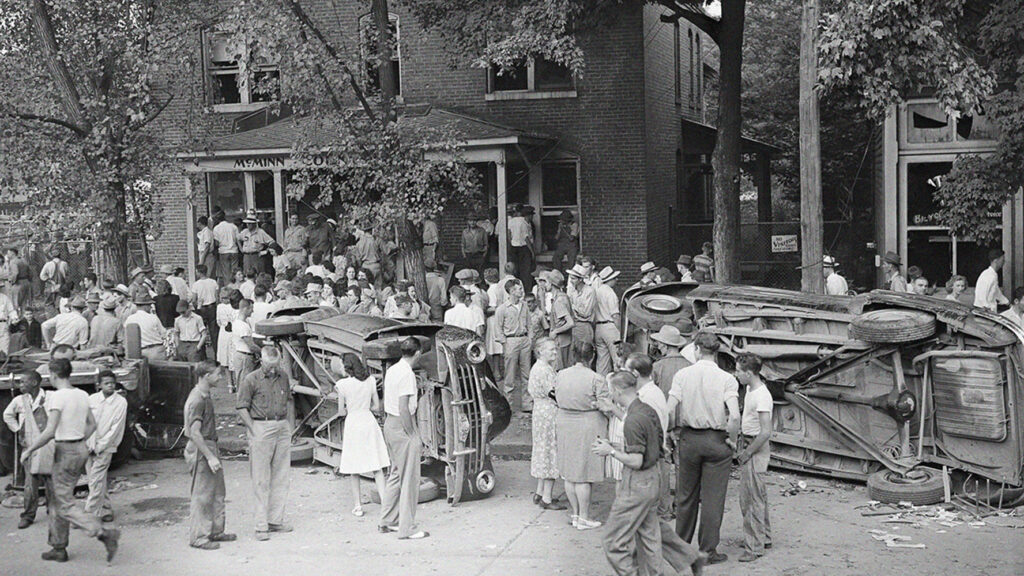
The scene in front of the McMinn County jail in Athens, Tennessee, the morning after the GIs fought the deputies barricaded inside the jail. The GIs controlled the county in the aftermath of the battle. (AP Photo)
Veterans Refuse to Back Down
Fed up with the corruption, a group of returning veterans organized a reform movement. They formed the GI Non-Partisan League and ran their own candidates in the August 1946 elections, determined to restore democratic governance to McMinn County.
But the Cantrell machine had no intention of giving up power peacefully. On election day, armed Cantrell deputies clashed with equally determined and armed veterans at polling places throughout Athens. Tensions exploded when some officials seized ballot boxes and took them into the county jail, refusing public oversight.
What followed became known as the Battle of Athens. The veterans, using their military training, took up strategic positions around the jail and demanded a fair count. A violent standoff erupted, with gunfire and even dynamite exchanged between the two sides. Finally, around 3:30 a.m. on August 2, the deputies surrendered and turned over the ballot boxes.
The ballots were counted publicly. The result: a landslide victory for the GI Non-Partisan League, which won by nearly a two-to-one margin.

Like arguments at the family dinner table, the Battle of Athens faded away not fully resolved. (Illustrated by ChatGPT.)
Aftermath and Amnesia
Despite its dramatic nature, the Battle of Athens has faded into relative obscurity—a quirky piece of local trivia rather than a widely recognized episode in American democratic history. In the aftermath, McMinn Countians largely moved on. Both sides—the Cantrell machine and the GI reformers—spoke little of the conflict. Though it’s now remembered with local pride, the battle initially carried a sense of embarrassment.
To many, the violence seemed to confirm negative stereotypes: hillbillies settling scores with guns in the lawless hills of Tennessee. National headlines didn’t help. On August 2, 1946, The New York Times ran stories like “Tennessee Sheriff Is Slain In Primary Day Violence” and “Armed Veterans Run Town After Tennessee Bloodshed.” For many locals, the headlines were not a badge of honor but a scandal to forget.
Like a family argument at the dinner table, the battle became something people didn’t talk about. Over time, it receded into silence—never fully forgotten, but rarely discussed. Psychologists might describe this as emotional distancing or unresolved conflict, but the reality is simpler: the battle achieved its goal. It corrected the course of a local political system that had strayed far from democratic norms.

Modern day view of Athens Courthouse. (Image by D. Page.)
Legacy and Lessons
That said, corruption did not vanish from McMinn County overnight. In the wake of the battle, the worst excesses—especially those under Cantrell—subsided. But to expect the complete eradication of corruption from politics would be, as Cervantes might say, a quixotic quest. The battle was not the end of political imperfection, but it was a powerful moment of accountability—one that reminds us what citizens can do when they refuse to tolerate injustice.
The Battle of Athens stands as a powerful reminder that democracy does not sustain itself—it must be defended not only abroad, but at home. These veterans, fresh from the battlefields of World War II, recognized that the principles they had fought for overseas were being undermined in their own backyard. Rather than accept a rigged system, they took a stand—at great personal risk—to restore free and fair elections in their community.
Their story is a testament to the idea that ordinary citizens, when organized and resolute, can hold the powerful to account. It also serves as a warning: corruption can take root anywhere, and the price of democracy is eternal vigilance. The Battle of Athens may have been fought with rifles and dynamite, but its deeper lesson endures—true democracy requires not just voting, but the courage to demand that every vote counts.
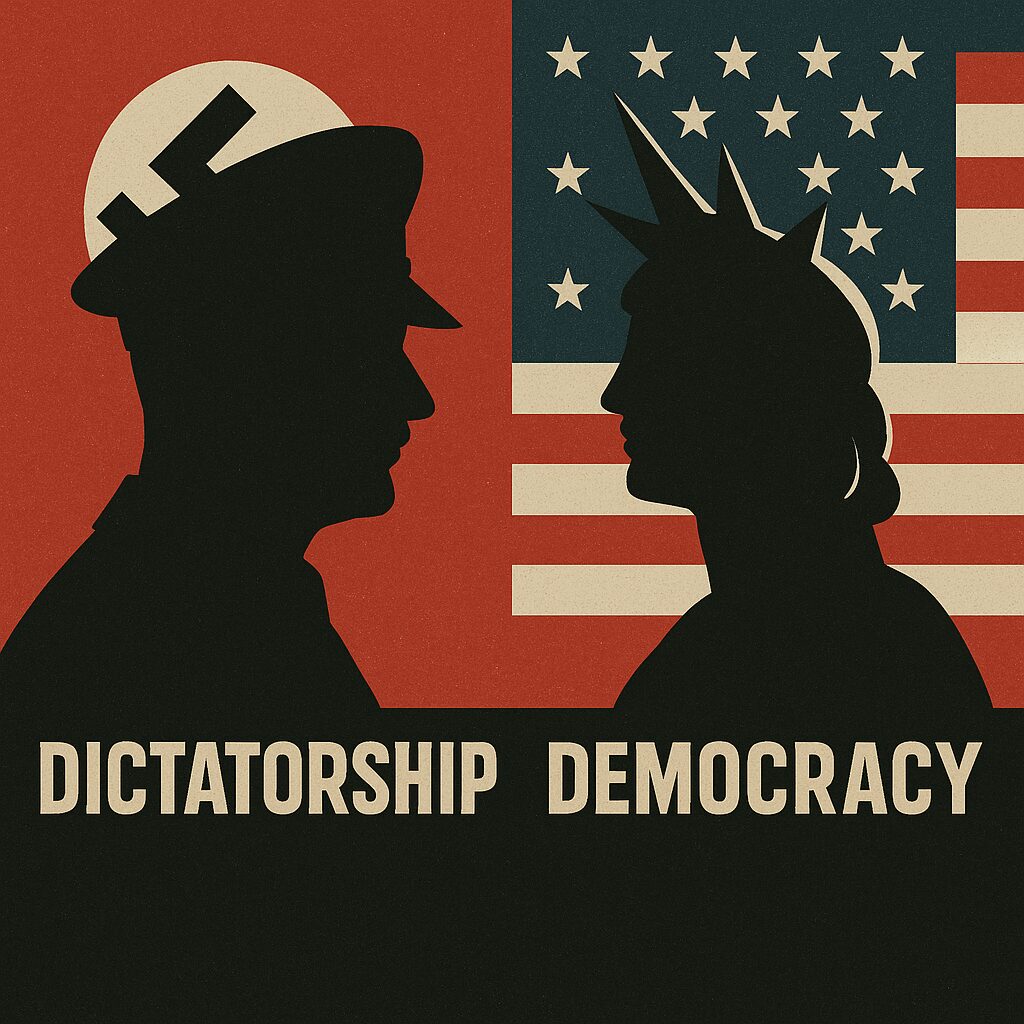
Corruption in a democracy is no better than a dictatorship. (Image by ChatGPT.)
The Deeper Lesson: Decriminalize Politics
One of the most striking and timely lessons from the Battle of Athens is this: we must learn to decriminalize politics. That may sound counterintuitive in light of the 1946 violence, but the veterans’ initial approach offers a modern insight. They didn’t rush to the courts to prosecute their political opponents. They didn’t try to jail the corrupt machine. Instead, they turned first to the democratic process—they organized, built a slate of candidates, and sought to win power at the ballot box.
In today’s hyper-polarized climate, the temptation to criminalize political opponents is growing. But democracy functions best when voters, not prosecutors, decide who holds office. The rule of law is vital—but it must not become a tool for political warfare.
Yes, the GIs eventually took up arms when pushed to the brink by blatant ballot theft. One can argue they might have found a less violent response. But the heart of their effort—their starting point—was electoral, not judicial. They trusted, at least initially, that elections could be the mechanism for reform.
Elections, if protected and respected, can cure many ills. Our Founders understood this. James Madison and others designed a system with frequent elections and overlapping levels of government precisely to counter corruption and foster accountability. Their hope was that, by regularly returning to the voters, the system would remain anchored in the will of the people–rather than the will of a judge or jury, the ballot box over the jury box.
That preference for the ballot over the courtroom is the enduring lesson of the Battle of Athens. In the face of abuse and injustice, our first and strongest recourse must be democratic participation—not political prosecutions, but political engagement. Not retribution, but representation.
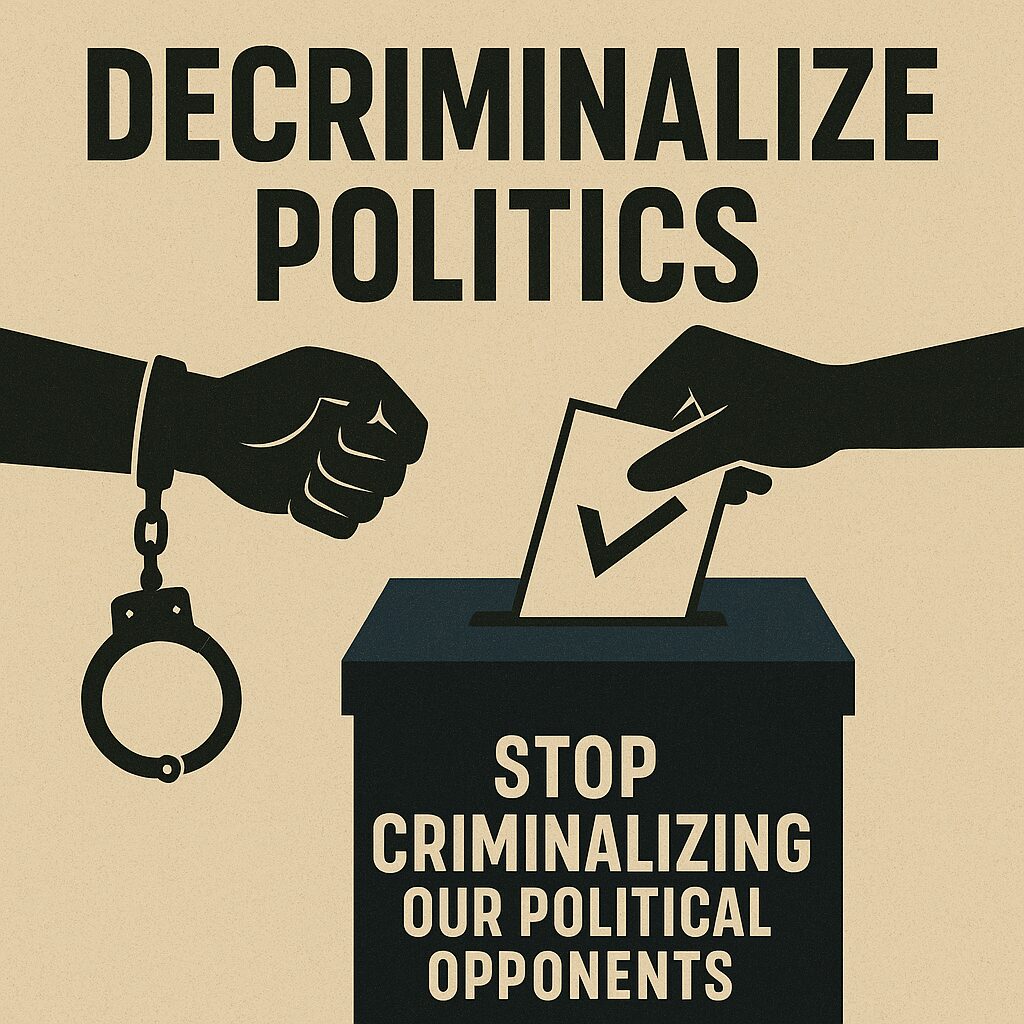
The non-obvious lesson from the Battle of Athens is the emphasis of the ballot box over the jury box.
Disclaimer: I wrote the original draft of this blog post and then asked ChatGPT to polish the draft and provide some images for illustrations.
References
- Brooks, J. E. (2018). Battle of Athens. Tennessee Encyclopedia. Retrieved 2018-03-01, from https://tennesseeencyclopedia.net/entries/battle-of-athens/
- DeRose, C. (2020). The Fighting Bunch: The Battle of Athens and how World War II Veterans Won the Only Successful Armed Rebellion Since the Revolution. Macmillan+ ORM.
- DeRose, C. (2020, 11/01/2020). ‘Get the Hell Out of Here and Get Something to Shoot With’. Politico. https://www.politico.com/news/magazine/2020/11/01/world-war-ii-veterans-rigged-election-433773
- Dershowitz, A. M. (2017). Trumped Up: How Criminalization of Political Differences Endangers Democracy. Bombardier Books.
- Gary, H. (2022). The 1946 Battle Of Athens, Tennessee Explained – Grunge. Grunge. Retrieved 2022-12-26, from https://www.grunge.com/1140258/the-1946-battle-of-athens-tennessee-explained/
- Solove, D. J. (2007). The Future of Reputation: Gossip, Rumor, and Privacy on the Internet. Yale University Press.
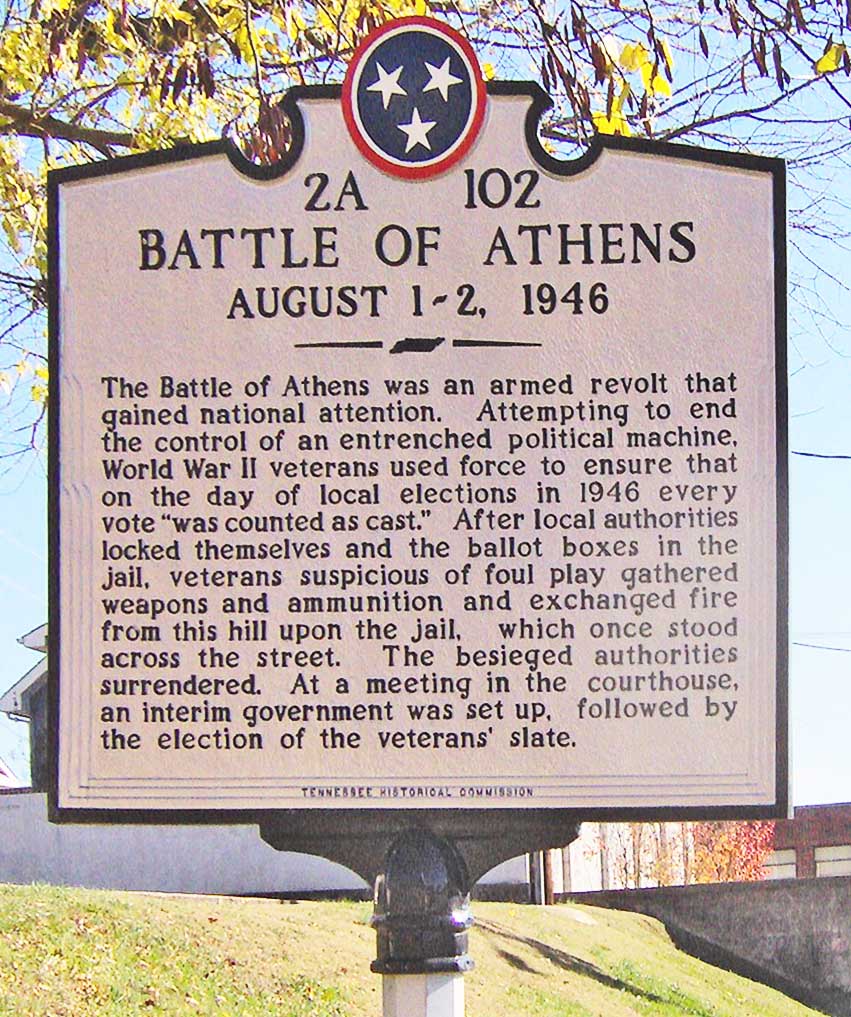
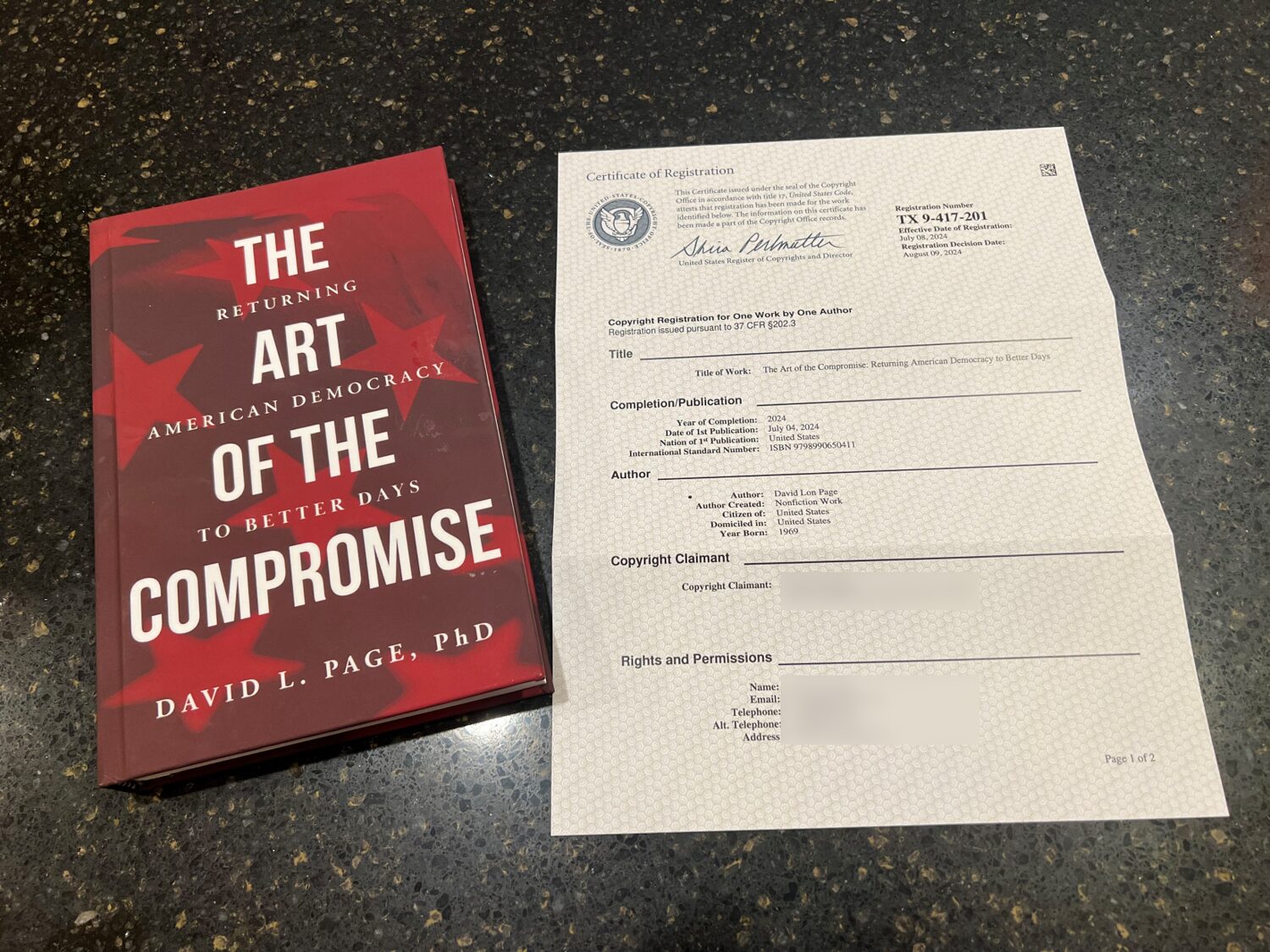
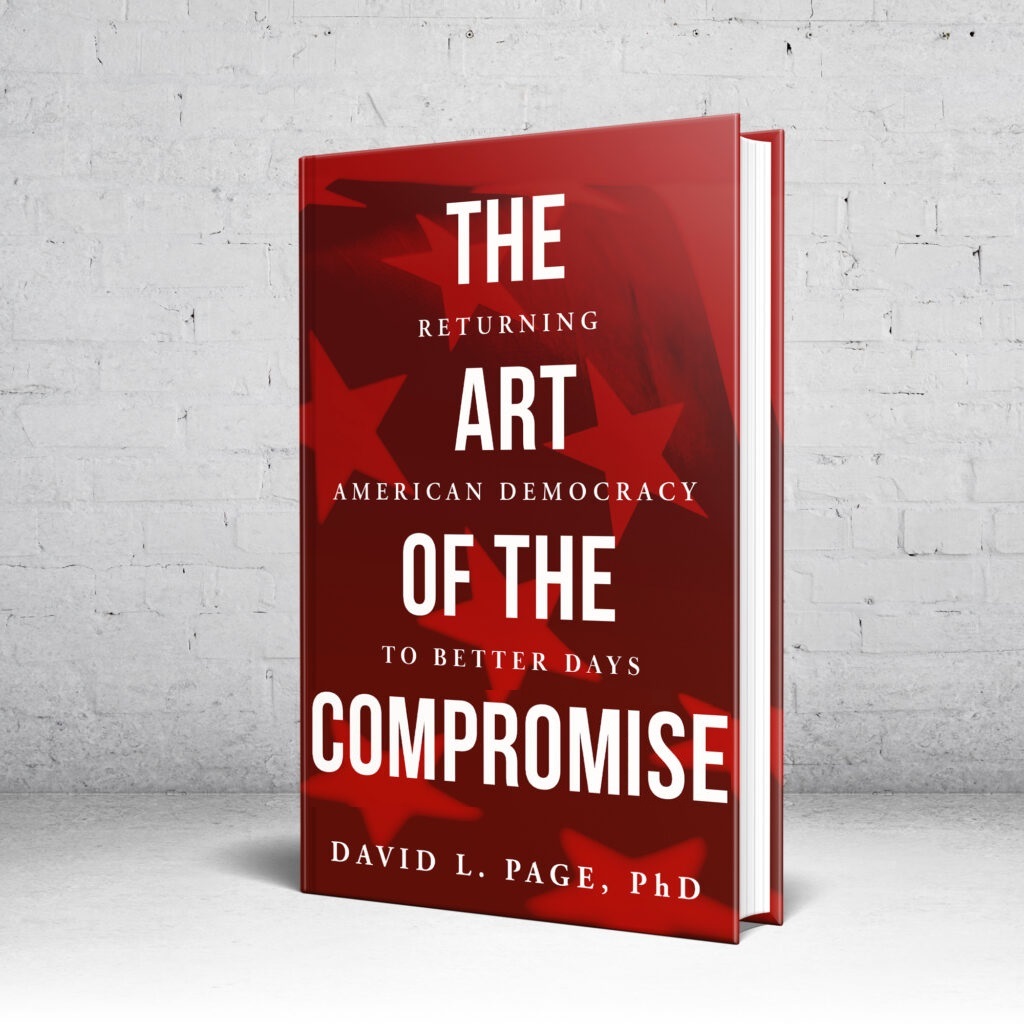
Dave, I strongly recommend you study Byrum’s book, The Battle of Athens.
KCPL used to have 2 copies. The general circulation copy is gone. Now the book is available only at the McClung collection, 3rd floor of ETHC.
You would appreciate Byrum’s decades long review of the dynamics that precipitated the 6Aug46 battle. He also follows up on the lingering effects through the election of 1952
Thank you! Yes, I’ve heard Byrum’s book is important to read. I’ll try to get a copy. The lingering effects would be interesting to learn more about.